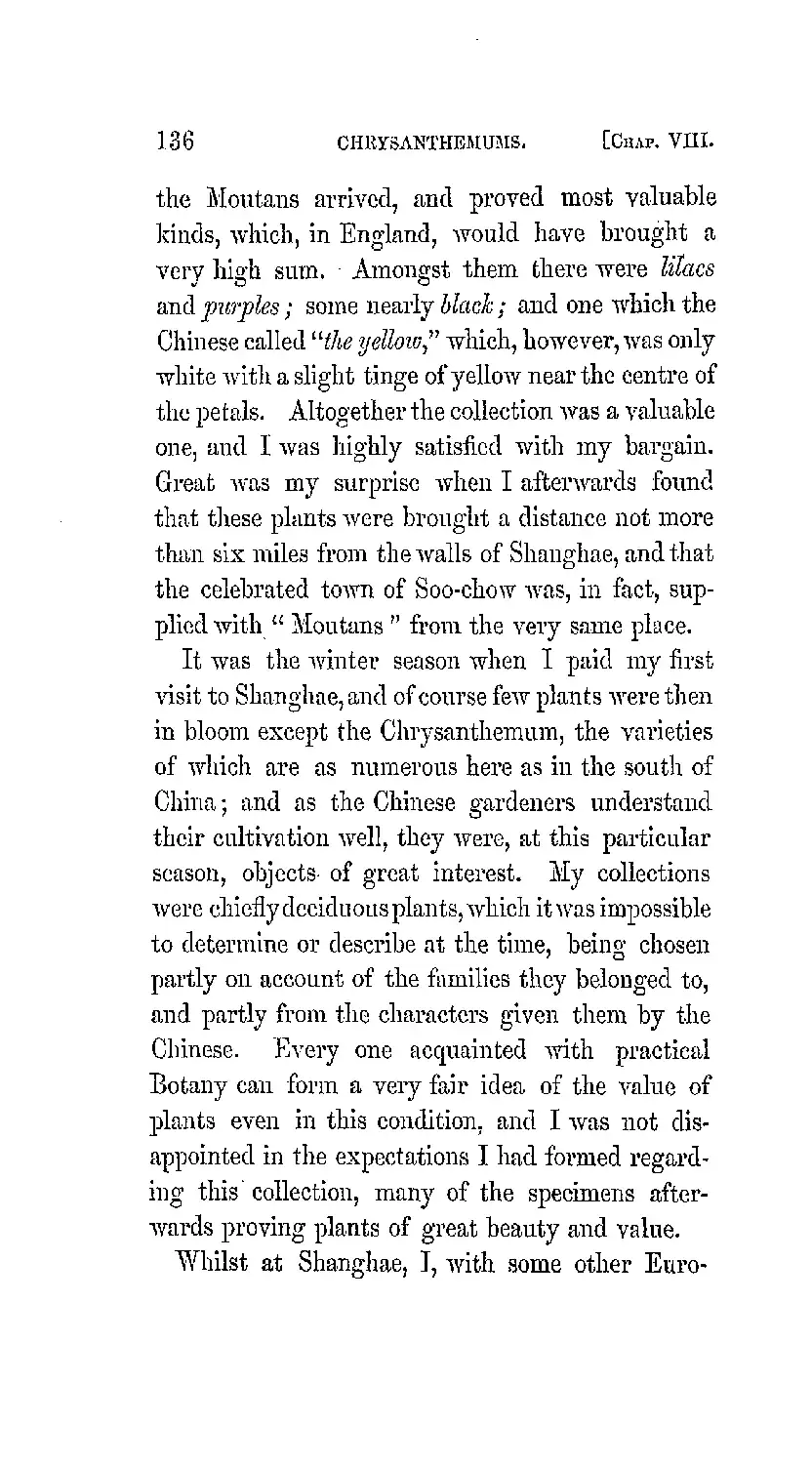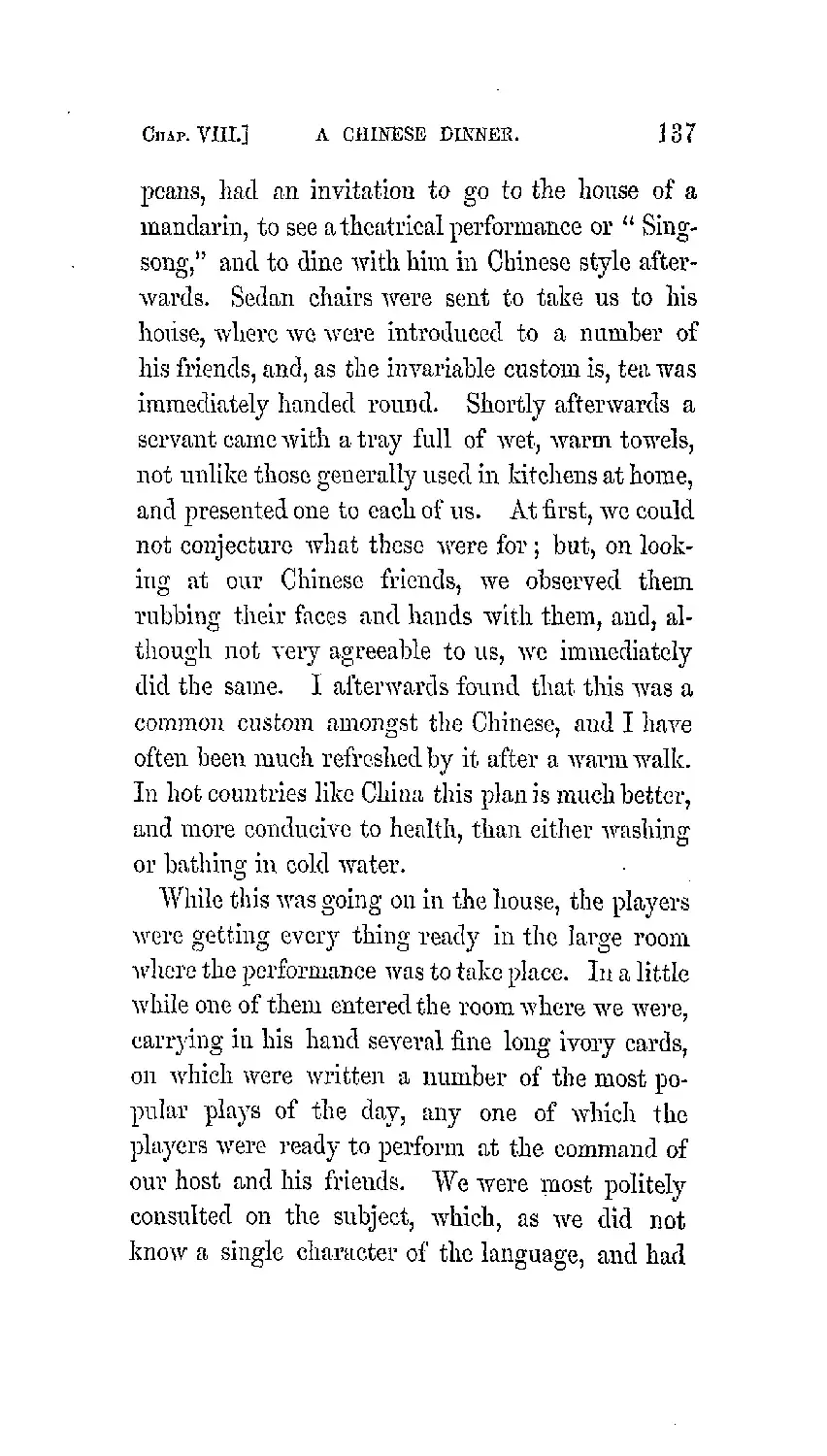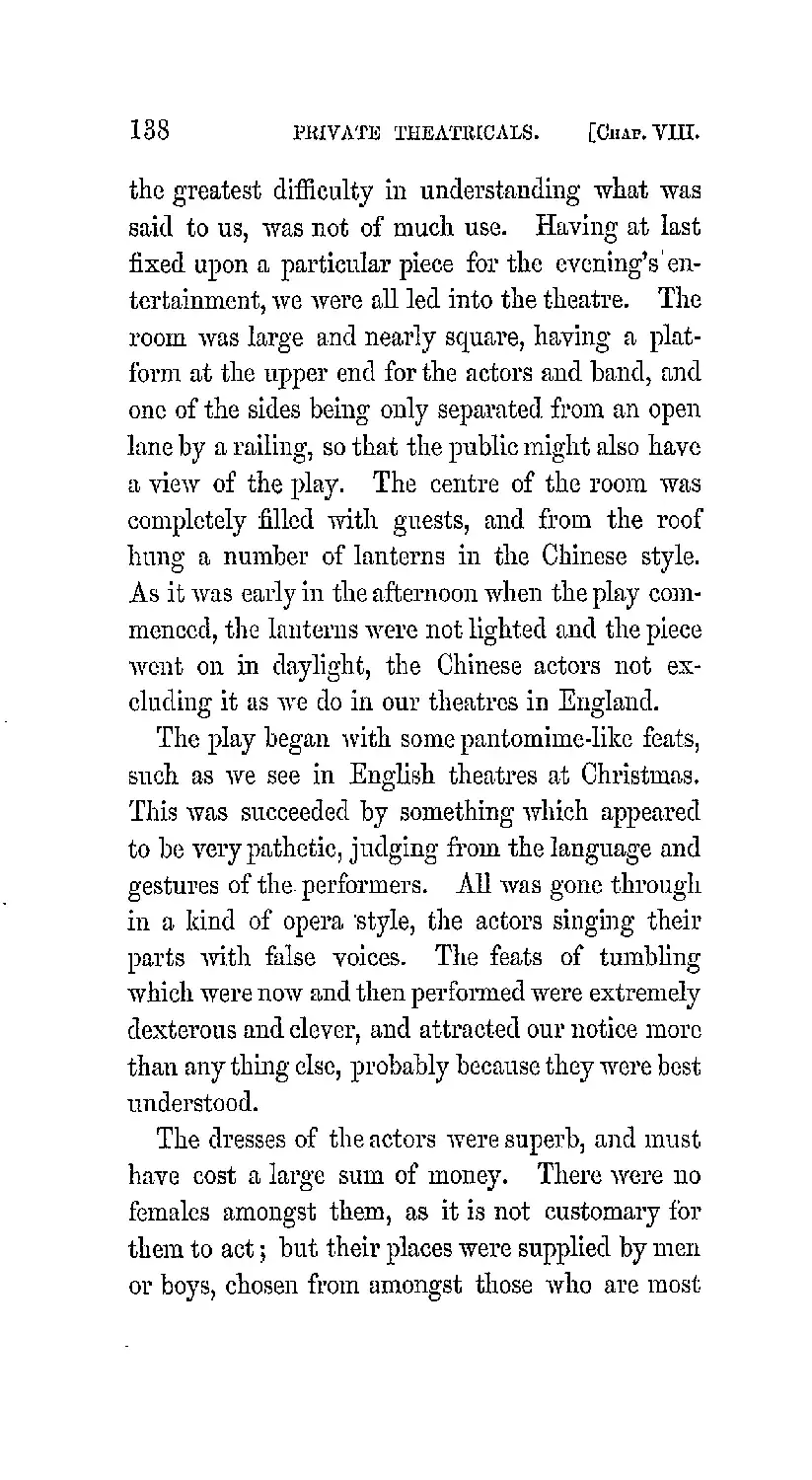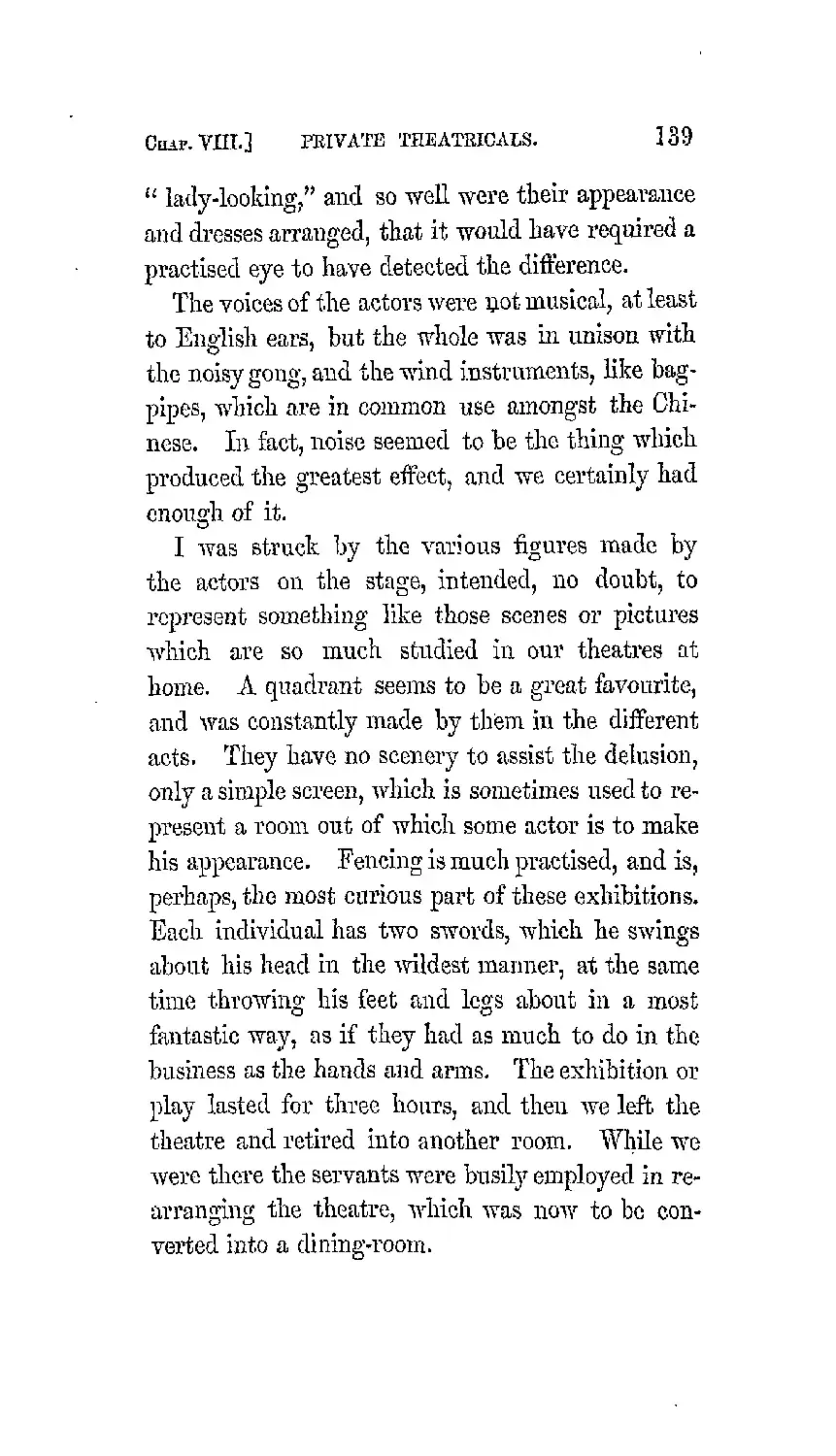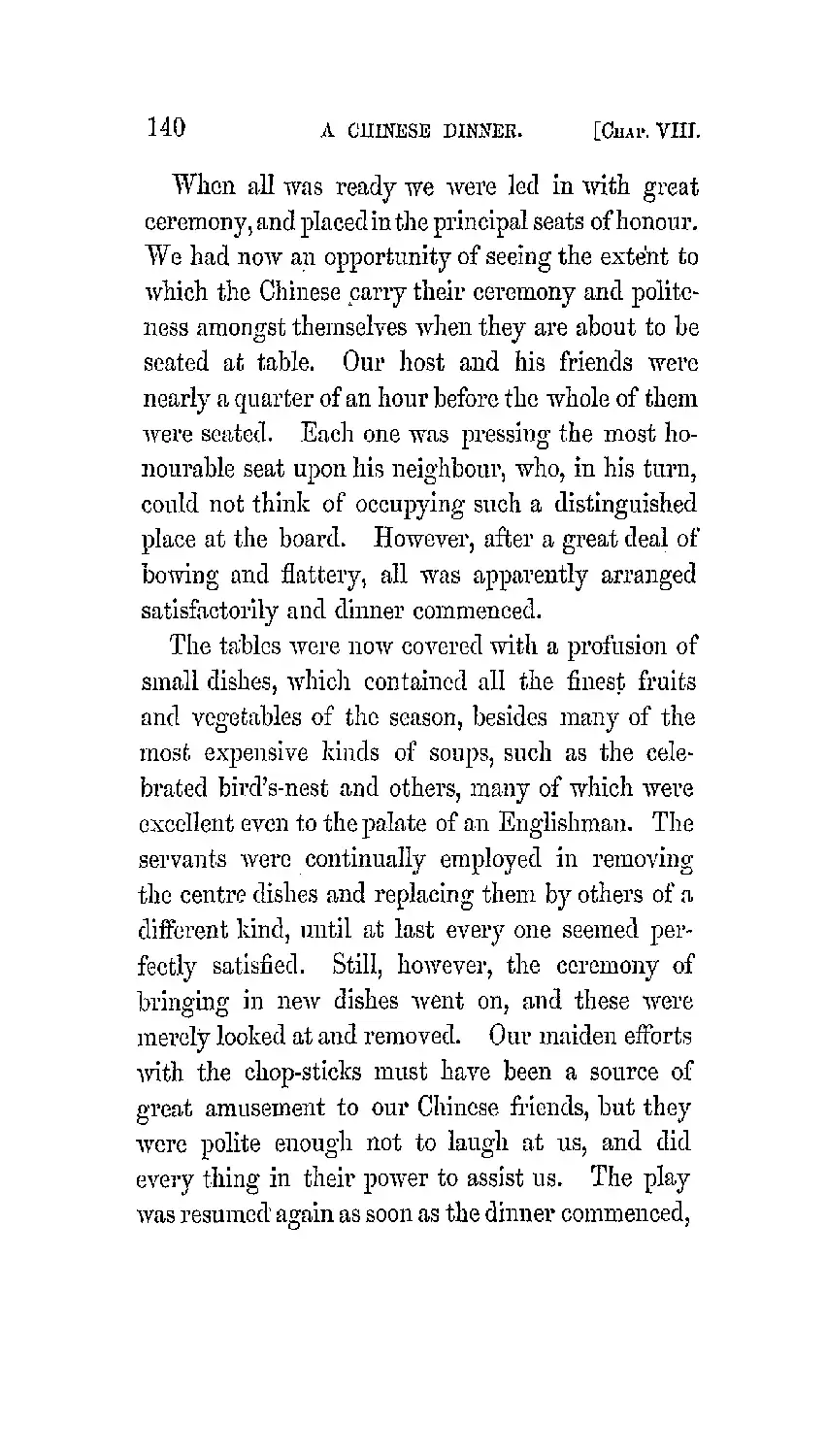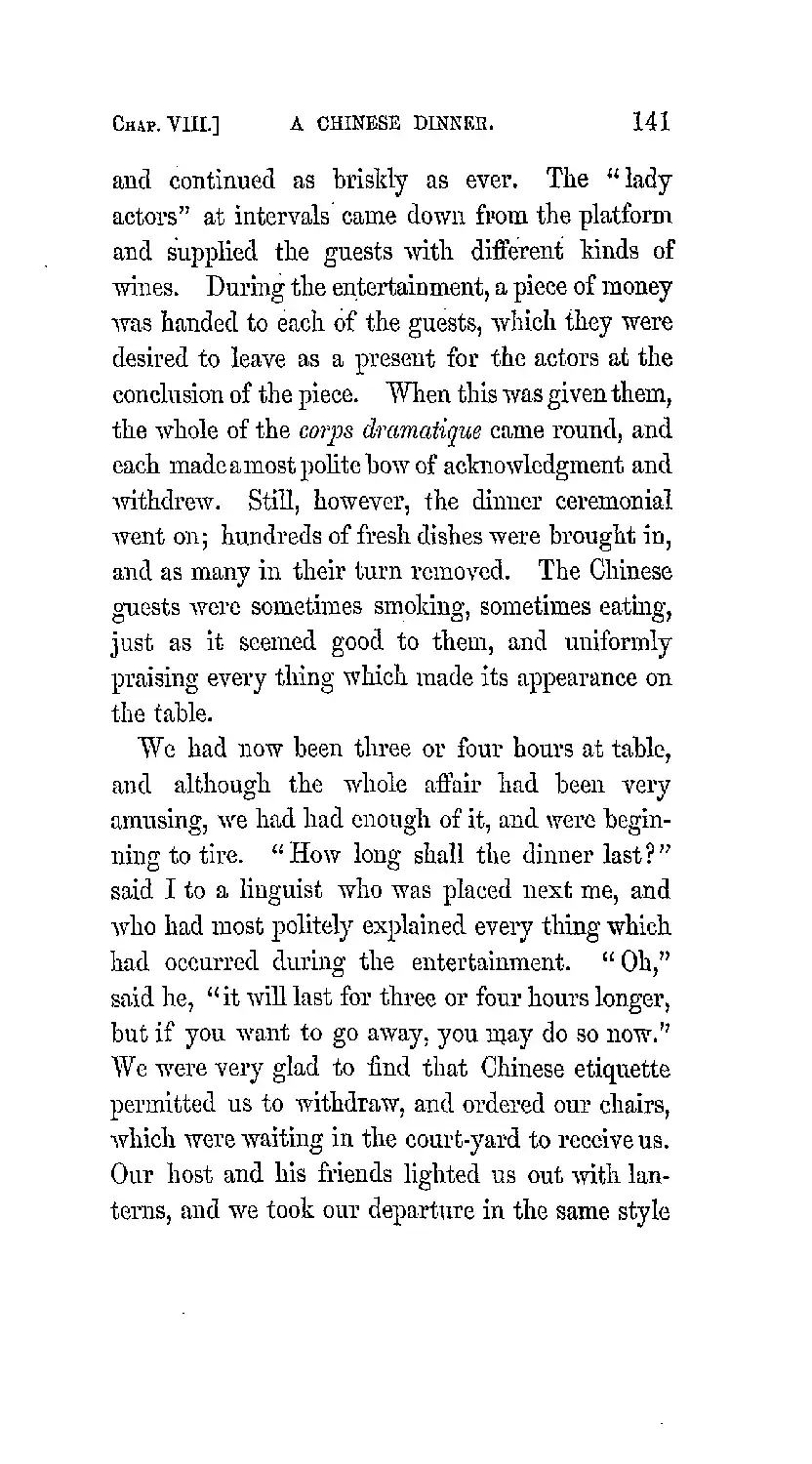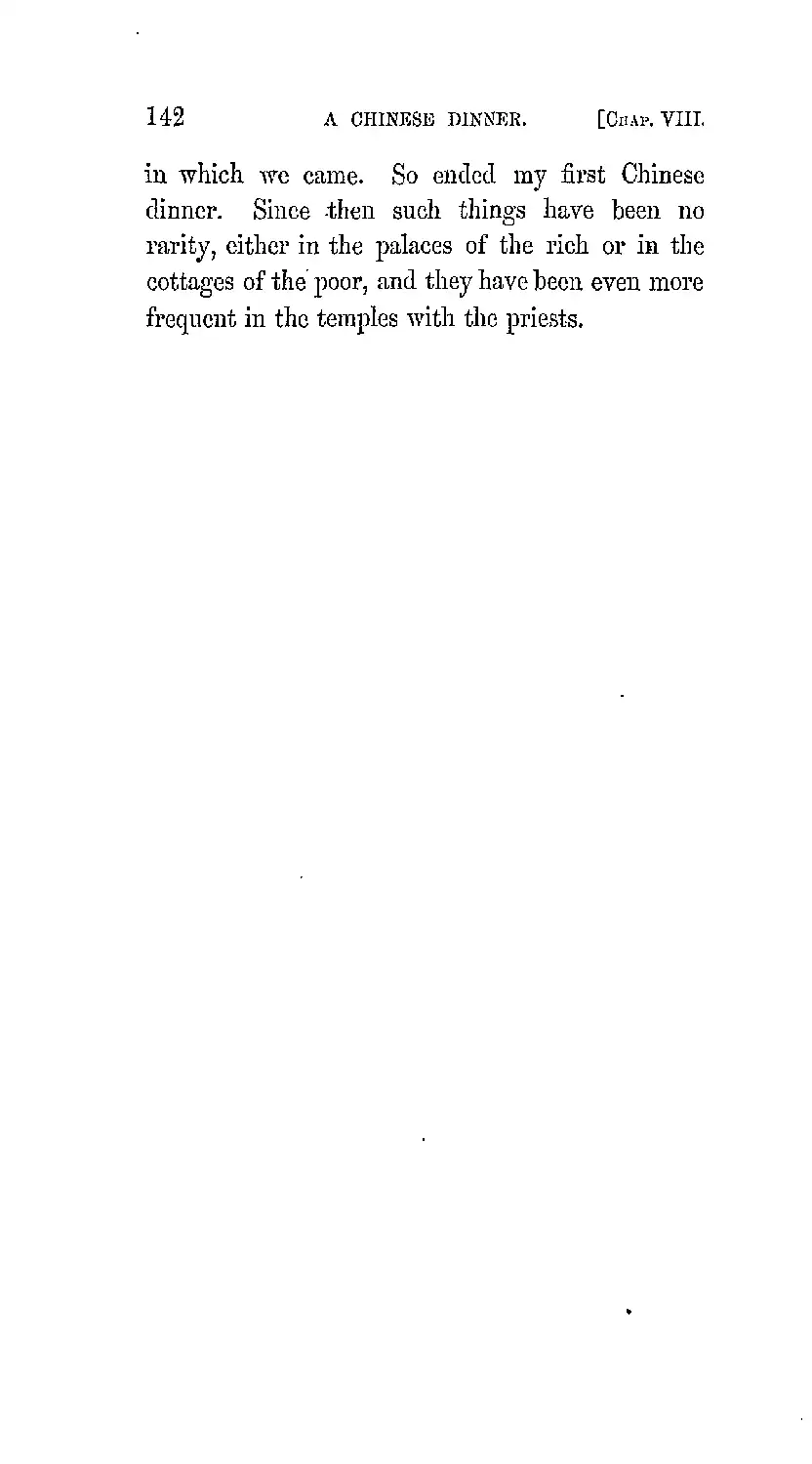Three Years Wandering in the Northern Provinces of China
- Info
- Pages
- Transcript
- Related
Whilst at Shanghae, I, with some other Europeans, had an invitation to
go to the house of a mandarin, to see a theatrical performance or
“Sing-song,” and to dine with him in Chinese style afterwards. Sedan
chairs were sent to take us to his house, where we were introduced to a
number of his friends, and, as the invariable custom is, tea was
immediately handed round. Shortly afterwards a servant came with a tray
full of wet, warm towels, not unlike those generally used in kitchens at
home, and presented one to each of us. At first, we could not conjecture
what these were for; but, on looking at our Chinese friends, we observed
them rubbing their faces and hands with them, and, although not very
agreeable to us, we immediately did the same. I afterwards found that
this was a common custom amongst the Chinese, and I have often been much
refreshed by it after a warm walk. In hot countries like China this plan
is much better, and more conducive to health, than either washing or
bathing in cold water.
While this was going on in the house, the players were getting every
thing ready in the large room where the performance was to take place.
In a little while one of them entered the room where we were, carrying
in his hand several fine long ivory cards, on which were written a
number of the most popular plays of the day, any one of which the
players were ready to perform at the command of our host and his
friends. We were most politely consulted on the subject, which, as we
did not know a single character of the language, and had the greatest
difficulty in understanding what was said to us, was not of much use.
Having at last fixed upon a particular piece for the evening’s
entertainment, we were all led into the theatre. The room was large and
nearly square, having a platform at the upper end for the actors and
band, and one of the sides being only separated from an open lane by a
railing, so that the public might also have a view of the play. The
centre of the room was completely filled with guests, and from the roof
hung a number of lanterns in the Chinese style. As it was early in the
afternoon when the play commenced, the lanterns were not lighted and the
piece went on in daylight, the Chinese actors not excluding it as we do
in our theatres in England.
The play began with some pantomime-like feats, such as we see in English
theatres at Christmas. This was succeeded by something which appeared to
be very pathetic, judging from the language and gestures of the
performers. All was gone through in a kind of opera style, the actors
singing their parts with false voices. The feats of tumbling which were
now and then performed were extremely dexterous and clever, and
attracted our notice more than any thing else, probably because they
were best understood.
The dresses of the actors were superb, and must have cost a large sum of
money. There were no females amongst them, as it is not customary for
them to act; but their places were supplied by men or boys, chosen from
amongst those who are most “lady-looking,” and so well were their
appearance and dresses arranged, that it would have required a practised
eye to have detected the difference.
The voices of the actors were not musical, at least to English ears, but
the whole was in unison with the noisy gong, and the wind instruments,
like bag-pipes, which are in common use amongst the Chinese. In fact,
noise seemed to be the thing which produced the greatest effect, and we
certainly had enough of it.
I was struck by the various figures made by the actors on the stage,
intended, no doubt, to represent something like those scenes or pictures
which are so much studied in our theatres at home. A quadrant seems to
be a great favourite, and was constantly made by them in the different
acts. They have no scenery to assist the delusion, only a simple screen,
which is sometimes used to represent a room out of which some actor is
to make his appearance. Fencing is much practised, and is, perhaps, the
most curious part of these exhibitions. Each individual has two swords,
which he swings about his head in the wildest manner, at the same time
throwing his feet and legs about in a most fantastic way, as if they had
as much to do in the business as the hands and arms. The exhibition or
play lasted for three hours, and then we left the theatre and retired
into another room. While we were there the servants were busily employed
in rearranging the theatre, which was now to be converted into a
dining-room.
When all was ready we were led in with great ceremony, and placed in the
principal seats of honour. We had now an opportunity of seeing the
extent to which the Chinese carry their ceremony and politeness amongst
themselves when they are about to be seated at table. Our host and his
friends were nearly a quarter of an hour before the whole of them were
seated. Each one was pressing the most honourable seat upon his
neighbour, who, in his turn, could not think of occupying such a
distinguished place at the board. However, after a great deal of bowing
and flattery, all was apparently arranged satisfactorily and dinner
commenced.
The tables were now covered with a profusion of small dishes, which
contained all the finest fruits and vegetables of the season, besides
many of the most expensive kinds of soups, such as the celebrated
bird’s-nest and others, many of which were excellent even to the palate
of an Englishman. The servants were continually employed in removing the
centre dishes and replacing them by others of a different kind, until at
last every one seemed perfectly satisfied. Still, however, the ceremony
of bringing in new dishes went on, and these were merely looked at and
removed. Our maiden efforts with the chop-sticks must have been a source
of great amusement to our Chinese friends, but they were polite enough
not to laugh at us, and did every thing in their power to assist us. The
play was resumed again as soon as the dinner commenced, and continued as
briskly as ever. The “lady actors” at intervals came down from the
platform and supplied the guests with different kinds of wines. During
the entertainment, a piece of money was handed to each of the guests,
which they were desired to leave as a present for the actors at the
conclusion of the piece. When this was given them, the whole of the
corps dramatique came round, and each made a most polite bow of
acknowledgment and withdrew. Still, however, the dinner ceremonial went
on; hundreds of fresh dishes were brought in, and as many in their turn
removed. The Chinese guests were sometimes smoking, sometimes eating,
just as it seemed good to them, and uniformly praising every thing which
made its appearance on the table.
We had now been three or four hours at table, and although the whole
affair had been very amusing, we had had enough of it, and were
beginning to tire. “How long shall the dinner last?” said I to a
linguist who was placed next me, and who had most politely explained
every thing which had occurred during the entertainment. “Oh,” said he,
“it will last for three or four hours longer, but if you want to go
away, you may do so now.” We were very glad to find that Chinese
etiquette permitted us to withdraw, and ordered our chairs, which were
waiting in the court-yard to receive us. Our host and his friends
lighted us out with lanterns, and we took our departure in the same
style in which we came. So ended my first Chinese dinner. Since then
such things have been no rarity, either in the palaces of the rich or in
the cottages of the poor, and they have been even more frequent in the
temples with the priests.
